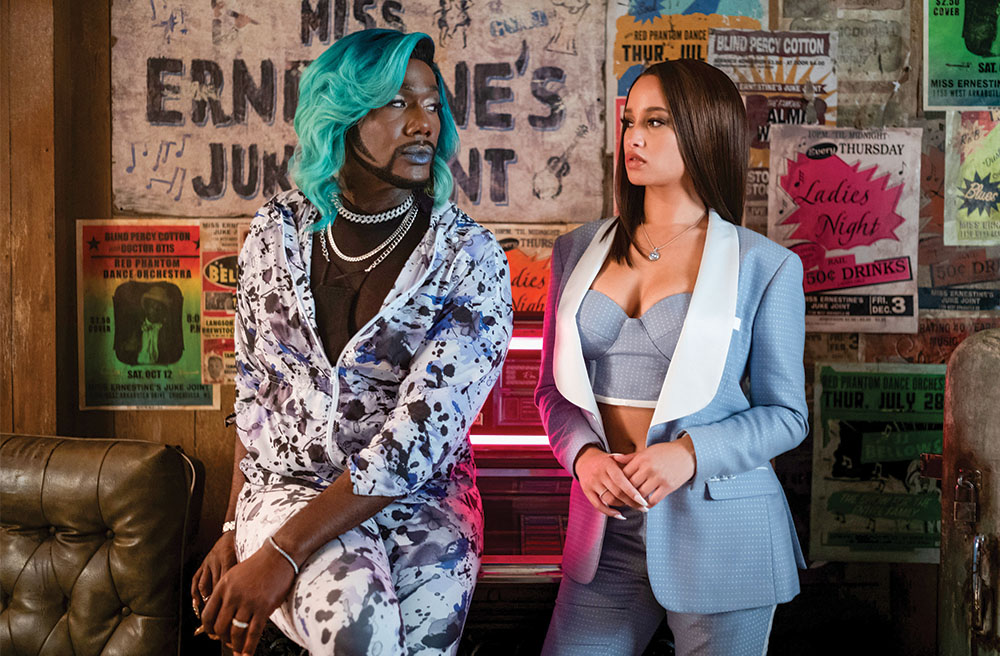
Courtesy of Starz Entertainment, LLC

On Starz’s P-Valley, Nicco Annan’s Uncle Clifford, the proprietor of the Mississippi Delta strip club at the show’s center, is part grounded caregiver and part bon vivant business owner. Annan originated the character — who identifies as nonbinary and uses she/her pronouns — when Katori Hall’s Pussy Valley was a stage play, so the actor has inhabited the character for the better part of the past decade. Ahead of being honored with the actor award for television at the Critics Choice Awards’ Celebration of Black Cinema & Television on Dec. 5, Annan talked to THR about nonbinary representation and Uncle Clifford’s wardrobe, including a cape made out of Crown Royal bags.
From the beard to the hair to the nails, Uncle Clifford cuts a striking onscreen image. How much does her appearance inform your performance?
The transformation happens first in the makeup chair. When Janine Carthone is doing my makeup, it’s a part of the transformation, even when Uncle Clifford is bare. All the characters in this world are some form of sex worker. To play that, for me, I have to get very comfortable in the body that I’m in. Sometimes it is actually more in character when I am not in costume. I always talk about the nakedness of a strip club, and that allows us — as the actors in the cast — to be so naked and raw in our acting. Then, for me, the wardrobe is when it really turns all the way up.

Courtesy of Starz Entertainment, LLC
What does the wardrobe say about her?
Uncle Clifford’s fashions are how she travels. It is how she sees the world and sees herself in the world. I remember being in the pandemic of it all, when we were coming up with options, I would tell [costume designers Alita McGhee Bailey and Tiffany Hasbourne], “This isn’t enough. The club is closed down, there’s nowhere to go, I’m dressing up. This has to be an event.” Everything became an event. When you were giving grandmother her insulin, you had a nice negligee, because you wanted to feel good. When you are first seeing Uncle Clifford this season, you’re seeing her in that cape at the car wash. That cape is made out of Crown Royal bags: 183 bottles of Crown Royal made that cape. So, all of that Crown Royal that’s at the club, Uncle Clifford brought [some] home. I read that [in the script] and I knew that there was a depression going on. I knew that there was a heaviness on the character. There was a different weight, and the wardrobe spoke that to me.
Uncle Clifford is one of the few examples of nonbinary representation in a major series. Is the history-making nature of the role something you have wrestled with?
It all started from doing the play when I understood that, as a gay man, there were certain freedoms that I was afforded, even in my own marginalized experience. I knew that as [an actor] playing Uncle Clifford, but if I were Uncle Clifford in real life — nonbinary people in real life, they don’t have some of those same freedoms and luxuries. When I felt that and when I understood that, I knew that there was a level of truth that had to be in not only the show, but in my performance. I did not want her to be a joke. I did not want people to just be enamored by the fashion. I wanted people to be able to really feel who she is and what she goes through.
What should the entertainment industry be taking away from the success of P-Valley, which has been renewed for a third season?
I hope that this is a signal to dream big. Katori dared to dream big with a character like Uncle Clifford, and in doing so, I think she hit the jackpot. I know I feel like I’ve hit the jackpot because there are no limitations on where she can go. And that’s a space we all are striving to be. Even Uncle Cliff is still striving to be there in all the freedom that she has.
Interview edited for length and clarity.
This story first appeared in the Nov. 30 issue of The Hollywood Reporter magazine. Click here to subscribe.